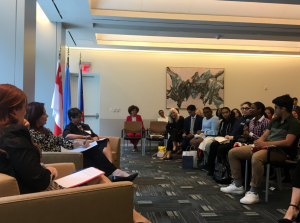– As delivered –
Statement by H.E. Mrs. María Fernanda Espinosa Garcés, President of the 73rd Session of the UN General Assembly
13 June 2019

Ms Latica Tomasic Kickert, President of the Women’s International Forum,
Your Excellency, Burhan Gafoor, Permanent Representative of Singapore to the United Nations,
Excellencies,
Ladies and gentlemen,
Let me start by expressing my warm thanks to the Women’s International Forum and the Permanent Mission of Singapore for this great initiative – and for the opportunity to share some personal reflections on a topic that is very close to my heart: “Women In Leadership – How to Build Cohesive and Inclusive Societies.”
Some of you may have heard me say that empowering women and girls is the closest thing we have to a ‘magic formula’ for sustainable development.
And it’s true. The evidence is overwhelming.
When women participate in peace processes, they are more likely to last. When women work, the economy grows faster. When girls are educated, their families are healthier. And yet, women still face huge hurdles that prevent them from harnessing their potential, and their communities from reaping the benefits.
That is why I – only the fourth woman in UN history to serve as President of the General Assembly – chose to dedicate my term to women and girls, and to organize the first-ever high-level event on “Women in Power”, which saw the participation of half the world’s female Heads of State and Government at the time, and which produced a ‘call to action’ on advancing women’s leadership.
Representation alone cannot guarantee success. The root causes of discrimination are many and complex. But we need to have women in positions of power if we are to have any hope of improving the lives of women and girls around the world.
That goes for the United Nations, as well as for governments, companies trade unions, NGOs and community organizations. And in all these settings, we still have a long way to go.
So what can we do?
When women participate in peace processes, they are more likely to last. When women work, the economy grows faster. When girls are educated, their families are healthier. And yet, women still face huge hurdles that prevent them from harnessing their potential, and their communities from reaping the benefits.
As PGA, I have adopted four approaches:
First, strengthening networks. Informal networks and mentoring made a huge difference when I was in government. Today, I am proud to be part of the International Gender Champions Network, which collectively has made over 600 commitments to advancing gender equality.
Second, putting a spotlight on women’s leadership. As Ecuador’s foreign minister, I was able to make gender equality central to all areas of the ministry’s competence. Our global gender policy was the first of its kind in Latin America and it made a big difference.
So this January, I convened an informal advisory group of Gender Equality Leaders to share best practices on removing barriers to women’s leadership in the public and private sectors.
Third, I have sought to engage the broadest possible circle of stakeholders, through trips, partnerships and social media. We need to hear more from women and girls around the world, and we need to listen to them.
And finally, I have sought change through the formal work of the General Assembly. Nearly 60% of the co-facilitators I have appointed are women. I have also encouraged Member States to go further, for instance, by considering voluntary quotas for their delegations, or a voluntary pledge to nominate women for senior UN appointments.
Next year, we will celebrate the 25th anniversary of the Beijing Declaration and the 75th anniversary of the UN. This is a golden opportunity to think more creatively on how to advance women’s leadership – across the road, in capitals and in communities. I look forward to hearing your thoughts and ideas.
Thank you.
 Making the United Nations Relevant to all People
Making the United Nations Relevant to all People